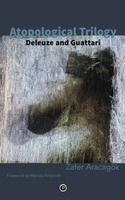Atopological Trilogy: Deleuze and Guattari
Author(s)
Aracagök, Zafer
Contributor(s)
Antonioli, Manola (editor)
Collection
ScholarLedLanguage
EnglishAbstract
Atopological Trilogy creates new concepts for Deleuze-Guattarian thought without any heed for sectarian, sermonising, or dutiful readings of the philosophers. In Part I of the trilogy, “Becoming-Sexual of the Sexual,” Aracagök demonstrates the ways in which quantum theory and the concept of “complementarity” inform Deleuze and Guattari’s thought, especially in relation to “becoming” in general and “becoming-woman” and “becoming-queer” more particularly. Aracagök argues that the ways in which the philosophers put forward a ban on “becoming-man” with a certain degree of undecidability encapsulates (albeit in a cryptic form) other becomings, the most important of which is becoming-queer, or rather, the becoming-sexual of the sexual. In Part II: “Deleuze on Sound, Music, and Schizo-Incest,” Aracagök puts into resonance the sound, noise, and music (and the question) of schizo-incest with the intention of deterritorialising a notion of the meta-audible. If Kafka’s story, “The Investigations of a Dog” leads us to a realm of the “formless” which cannot be heard without destroying what we know as “hearing,” it also offers us a limit-experience of the meta-audible, which, when radicalised via the notions of “schizo-incest” and “self-shattering,” creates a line of flight that escapes even from the line of flight itself. All these maneuvers pose a serious challenge to Deleuze and Guattari, who claim that despite all his investigations, Kafka’s investigator dog is re-Oedipalised in the end. Proposing in the end a limit experience which Aracagök calls the “meta-audible,” he shows that Kafka’s more radical approach to sound creates a line of flight that escapes even from the line of flight itself
Keywords
psychoanalysis; cultural studies; Gilles Deleuze; noise; Felix Guattari; perversionDOI
10.21983/P3.0096.1.00ISBN
9780692403723OCN
945783209Publisher
punctum booksPublisher website
https://punctumbooks.com/Publication date and place
Brooklyn, NY, 2015Classification
Western philosophy from c 1800


 Download
Download